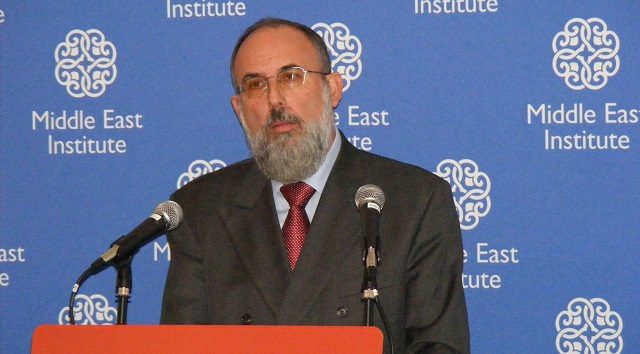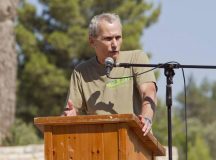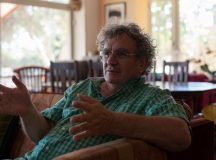BICOM Chief Executive James Sorene spoke with Koby Huberman, who was a high tech entrepreneur before it was fashionable, and now head of the Israel Peace Initiative (IPI). The IPI advocates a regional approach for a two-state solution and the end of conflict as the only way to ensure a strong prosperous Israel with a Jewish majority.
James Sorene: What is the IPI and why did you set it up?
Koby Huberman: The IPI Group is an Israeli NGO that was formed back in 2011 by Yuval Rabin, the son of the late Yitzhak Rabin, myself, Yaakov Peri – the former head of the Israeli Shin Bet – and Amnon Lipkin-Shahak, who used to be the IDF chief of staff. It was formed as a non-right, non-left organisation – an impact group. not a protest group. We wanted to promote a concrete idea that we thought was necessary at the time, and still is, of a different paradigm to address the Israeli-Palestinian conflict.
Our belief was that we should present a response to the Arab Peace Initiative, as a starter in order to enable a different negotiation architecture that will combine Israel, the Palestinian Authority (PA), and certain Arab states, in order to create an integrated solution – a two-state solution in the context of a regional solution.
We work on two parallel fronts. Firstly, to continue our outreach and engagement with interlocutors and influential people in the Arab world through track two or informal quiet back-channel diplomatic opportunities, with the objective to show Israelis and Israeli decision makers that we have partners and there is credible visibility to drive this model. That’s the activity that we push.
Second, in order to really create awareness and engagement in Israel, we have used all the things we have learned from the Arab world and brought it to Israeli decision makers. But we also created detailed studies about how it will impact Israel’s security, its economy, its position in the international community, and how the Israeli public will accept it. Those insights enable us to present a cohesive regional option as a strategic roadmap for the Israeli government and the Israeli political system.
To summarise, our role is to engage with the Arab world to find visibility and partners, and then to present, advocate and try to impact Israeli decisions and strategies through quiet advocacy efforts behind the scenes.
JS: Could you give us a sense of the scale of how many people you’re talking to, and what countries?
KH: Over the years we have met hundreds of people from the Arab world. We meet in conferences, track two meetings, and other platforms organised by third parties. We are also able to use the benefits of technology and interact on Facebook, WhatsApp and email. Things have opened up quite dramatically in the last five years.
We have met the top influencers in the major Arab countries such as people who have retired from governments but still advise leaders or business people, ex-diplomats, ex-security officials, academics, and media.
JS: And are you confident that they have the same access as you do?
KH: I am. Sometimes I envy their access.
JS: What could potentially happen that perhaps people don’t realise?
KH: On a pure strategic interest based analysis we definitely see convergence of interest between Israel and certain Arab states. The key themes are the concern about Iranian hegemony – not just a nuclear programme but its involvement in various frontiers in the Middle East. The other shared concern is the rise of fundamentalist Islamic terrorism or sub-states, like ISIS. But I would add a few others to the equation that has emerged in the past few years. Many in Israel and the Arab States are worried about America’s position in the Middle East and its changing commitment and engagement to the area.
The other area of concern is the future of regional economies, not just because of terrorism but also due to structural problems and the perception of the Middle East as a poor place to invest. We also have shared concerns about food security, the environment and a host of other issues.
Because of these shared concerns, the conversations and discourse is no longer just about 1967 borders and the Israeli-Palestinian issue but about the bigger picture of the Middle East and Israel’s future and its relationship with the Arab states. We have reached the stage where we cannot just look at the Israeli-Palestinian issue as a fragmented, isolated question. We need to leverage the Arab Peace Initiative and reach a two-state solution within the context of a regional agreement and create a regional security alliance to confront common threats.
Look at it like a NATO in the Middle East; we need to jointly work on saving the Middle East from economic and environmental disasters. These things must primarily depend on a fundamental decision to solve the Israeli-Palestinian conflict. It is at the heart of this. There are no shortcuts. If we want to reach this regional alliance, it has to include a solution to the Israeli-Palestinian conflict, as well as the Israeli-Arab conflict.
JS: How can Arab States help Israelis and Palestinians reach a solution and how can they help the Palestinians towards a deal?
KH: There are five major areas in which Arab states could help the process. Number one, they could help the Palestinian leaders agree on concessions that otherwise wouldn’t be possible. When the Palestinian leaders have the backing of the entire Arab world – or the majority of the leading Arab states – their ability to make certain concessions changes. As one Palestinian ex-Minister told me ‘Look, we know that what you’re proposing is the right solution for the Palestinian refugee issue, but we can’t accept it ourselves, it must be seen as if we’re forced to accept it by the entire Arab world. And don’t quote me on that.’
Second, the core issues between Israel and the Palestinians must have the involvement of the Arab States. You can’t solve the issue of Jerusalem without Saudi Arabia, Jordan and Morocco. You can’t solve the eastern border issue without Jordan or border security on the Gaza front without Egypt, so they must be involved. The issue of Palestinian refugees cannot be resolved without the involvement of Arab states and their willingness to fund some of the investments required.
The third reason is that Palestinians and Israelis don’t trust each other but they trust the Arab states – the Israelis more than ever before. A commitment from Arab states to the future of Palestine and building it as a model state is clearly something that could help.
The fourth is very simple. A Palestinian demilitarised state has very little to offer Israel in terms of strategic regional security, which could only evolve out of a regional security alliance led by key Arab States and Israel. We are proposing a very different paradigm whereby concessions to the Palestinians are met by cooperation with the Arab world. It’s no longer just this zero-sum game between Israel and the Palestinians.
Last but not least, if there is an agreement, there will be a huge effort by spoilers to derail it. This could be Hamas, internal extremists in the PA, regional forces or even Israelis. We don’t know. The only people who could take care of these threats and secure the Israeli-Palestinian agreement from being derailed – like what happened with the Oslo Accords – are the Arab states.
JS: What can the Arab states give that they’re not already doing at the moment. What else is there on the horizon?
KH: Security, international legitimacy and large-scale trade and economic cooperation. Security co-operation is the basis and there are plans for opening up borders for tourism, cultural cooperation as well as economic, technology, medical and healthcare opportunities. There’s so much to be achieved between us and the Arab states. We can build an atmosphere closer to that of different states within Europe. We will still maintain our borders. I don’t believe in a unified federation in the Middle East but there’s so much to be done.
JS: What is your response to the criticism that these are just amazing private conversations that will never be repeated in public?
KH: We should look at it from the perspective of Israel’s interests. We need to solve the problem with the Palestinians and the two-state solution is the only viable solution. Public surveys show that Israelis support this model. But we cannot achieve this solely through bilateral negotiations. If we want to leverage the regional approach Israel must respond positively to the Arab Peace Initiative. This would change the dynamics in the Middle East. When Arab leaders and states see that Israel is serious about making progress in this direction it will change the discourse. If we establish cold peace with certain key Arab states and only in the next generation create a platform for cooperation, fine – we’ll take it. We don’t need to have romantic dreams about humus in Damascus. We want decent, neighbourly, relationships in a secure environment. We want to see a reduction in violence and increasing areas of cooperation. Our expectation is that another generation of development will be necessary, but we believe that the political trigger – and the political solution –could be found in the next three to five years and that will unlock the possibility of further co-operation in the future.
JS: How is the current generation of Arab leaders kind of different to what we’ve seen before?
KH: There has been a changing of the guard but we believe that in the long term we will see the emergence of a new, younger and more open-minded generation. Alternatively, the internal fighting in the Arab world will create a more extreme type of leadership.
The current leaders in Saudi Arabia – Mohammed bin Nayef, Mohamed bin Salman and King Salman himself – are different types of leaders. As are King Abdullah of Jordan and General al-Sisi in Egypt. There is also a young Emir in Qatar and an emerging generation in the Arab world that we could do business with. It won’t be everywhere at the same time. But the pragmatic approach is going to be more relevant in the Arab states than the ideological and religious approach that we experienced in the past.
JS: What would you say is the most surprising thing that you’ve come across in your discussions?
KH: On a personal basis, the first time you meet people from these countries you realise that they are like you. They have families and aspirations. It’s enlightening. It brings the human touch and a sense of perspective that is an eye opener, and a heart opener.
Our Middle Eastern cultures see trust as more important than a document, a handshake as more important than a signature, and a sense of respect as more important than a declaration are much more productive.
I was also surprised by the emergence of women in the Arab world, which I thought was an extremely important and impressive phenomenon that is far from being recognised or appreciated. Brave, courageous women are speaking out on human rights. They may not necessarily appear in the political sphere but their voices are apparent in business, civil society and academia.
Lastly there is an emergence of a very bright young generation such as entrepreneurs and business people with a spark in their eye who want to modernise and change their lifestyle. They don’t want to be equated with ISIS, or seen just as rich ‘Gulfies’ but want to be respected. They are really interesting and vibrant and optimistic people that inspire you with their aspirations and their activities.
JS: Can you provide some insight about your impact on Israeli decision makers?
KH: The regional approach is now a de-facto benchmark. Five years ago there was very little awareness of it. We have to accept the fact that whenever Israeli strategy is transformed or changed dramatically it is always based on at least a decade of evolution.
Oslo was signed in 1993 but meetings between Israelis and representatives of the PLO started in the early 1980s. They were quiet and behind the scenes, it took time until it all amalgamated into a policy. We started to present our ideas four or five years ago and now increasing numbers of people in Israel accept the regional approach. Avigdor Lieberman mentioned the Arab Peace Initiative, Yair Lapid mentioned the Saudi Peace Initiative. Five years ago 10 per cent of Israelis declared they knew something about the Arab Peace Initiative. Today it’s close to 40 Per cent. This hasn’t happened because the Arabs did a tremendous job of marketing the Arab Peace Initiative. On the contrary, I think they missed an opportunity to do their marketing. Rather, it happened because more people realised that the old bilateral negotiation model with the Palestinians is not going to work and that there are other possibilities.
JS: Why do you think no Israeli government has accepted the Arab Peace Initiative, even as a basis for negotiations?
KH: The Arab Peace Initiative was presented in March 2002, the weekend of a huge terrorist attack in Netanya at the Park Hotel. The psychological scars cannot be ignored. When there was blood on the streets, and so much mistrust it was difficult to expect a proper response. From 2002 until early 2007, the Arab Peace Initiative was perceived and presented to Israel as a diktat. Although no Israeli government could accept it, no Israeli government wanted to reject it so the best thing was simply to ignore it. In 2007 there was an attempt by the Arab world to indicate that the initiative was something to be leveraged and discussed and this gradually started to change the attitude of Israeli leaders.
In Annapolis in November 2007 Prime Minister Ehud Olmert referred to the Arab Peace Initiative in his opening speech. The next turning point was in 2013 when the Arab League presented the idea of land swaps. That underscored that the initiative was not cast in stone but could be negotiated. In 2014 Saudi Prince Turki al-Faisal wrote an article in Haaretz that the Arab Peace Initiative could be negotiated over. This is a significantly different context to that of 2002, and represented an actionable proposal. Ever since 2011 we have tried to demonstrate how it could become a platform that Israel can respond to and negotiate on. But it took this amount of time to change the idea. I believe that we may see a nuanced embracement of the Arab Peace Initiative in the near future based on the understanding that not all of it is currently relevant. As an example, no one can expect Israel to withdraw from the Golan Heights now, even if that is written in the Arab Peace Initiative. So what we are trying to see is whether the Arab Peace Initiative could be embraced as a relevant framework to be negotiated in order to reach a two-state solution. That may be a more limited perspective, but it’s more realistic.
The Arab Peace Initiative essentially demands a complete Israeli withdrawal to agreed borders, a solution to the refugee problem, a divided Jerusalem and then normal relations. As a business person, it is a very tough deal to sign because you are asking me to unload all the stack of concessions and only then you’ll tell me what normal relations are going to be. If I negotiate I need to know what normal relations mean. There’s no way you can explain this other than in conversation. Second, we want the Arab states to demonstrate some advance deposits to give us some confidence that they are serious. Israelis are asked to freeze settlements and to take certain confidence building measures before an agreement is signed. So we’re mirroring this process by saying we can attempt to solve the Israeli Palestinian issues but that we also want an understanding of what commitments will be formalised from the Arab world. We want clarity that all parties – Israel, the Palestinians, the Arab states and maybe even the international community – must commit to initial steps in order to build confidence.
No one should seriously expect to sign a deal in which somebody tells you there will be normal relations without having an understanding of what that commitment and expectation means. Thus, negotiations with the Arab world in parallel will allow Israel to gauge for itself the extent to which this is feasible and desirable. It’s about the complexity of back loading all the promises versus frontloading some of them.
JS: What signs should be looking for that things are really changing?
KH: Officially things will change only when there is an Israeli initiative or a diplomatic process in place with the Palestinians and the Arab states in parallel. When this comes, then you can expect things to improve. Not just on the security side but on other fronts as well.
JS: What are you hearing from your Palestinian acquaintances about what Israel could and should be doing to move things forward?
KH: We’ve created a shared model with the Palestinians that was endorsed, supported and encouraged by some of our Arab interlocutors from countries like Egypt, Saudi Arabia and Jordan. We presented the things that Israel and the Palestinians should do before entering the negotiations. We have also described what the negotiation architecture should look like. It would include two parallel processes between Israel and the Palestinians and Israel and the Arab states, where concessions in one room would be met with benefits in the other.
We also agreed to introduce a new concept to change the previous ‘nothing is agreed until everything is agreed’ paradigm, to ‘whatever can be agreed should be implemented alongside the ongoing negotiations.’ We are trying to strengthen the perceived visibility of the negotiations with true facts on the ground.
In order to make that happen we need to see proactive involvement of certain Arab States. We need to see major public diplomacy addressed by the Arab States and the international community to the Israelis and the Palestinians in order to give them the confidence and the support that this process shall eventually succeed.
We have outlined a number of steps for the Israeli and the Palestinian side that would allow progress on this process. This includes a settlement freeze of sorts in those areas that are definitely not going to remain under Israeli sovereignty, the need to reduce the incitement and to change the tone and the media discourse on both sides.
JS: Those all sound quite straightforward. What else is there that needs to be done?
KH: Here’s the big secret. It is really straightforward. I don’t think that we are lacking intellectual or professional depth, nor an understanding of what this looks like. I have read hundreds of pages on each one of the core issues. No other business proposal I’ve ever seen on a start-up was that detailed. What we are lacking is courageous leadership and the political safety nets for the Palestinian, Arab and Israeli sides. That needs to be taken care of through guarantees as well as via continuous encouragement, political manoeuvring and a lot of public diplomacy.





































Comments are closed.